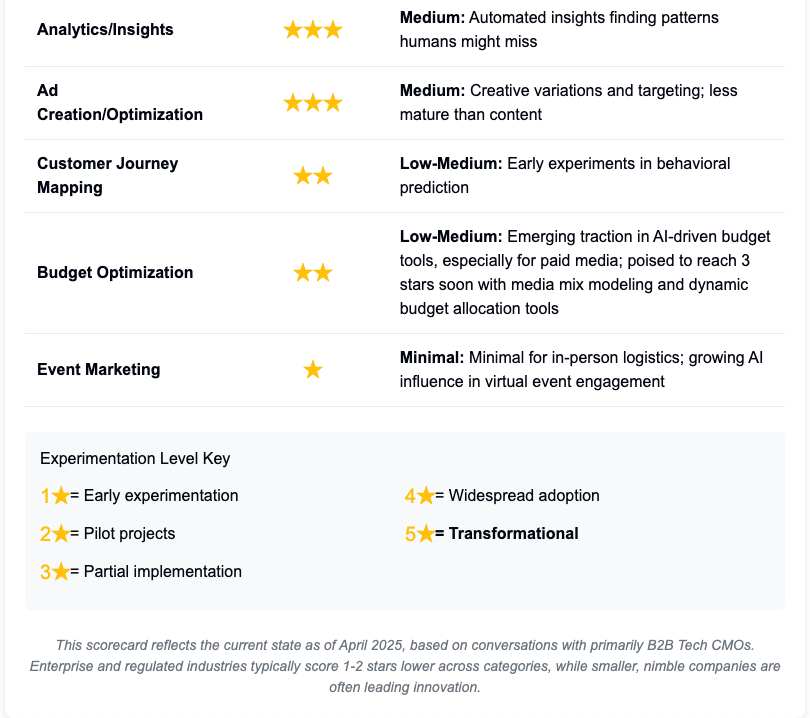2025 State of AI in B2B Marketing Scorecard
Which marketing functions are seeing the most adoption and transformation?
Yesterday, I covered 8 Key Trends on What's Working, What's Changing, and What's Next in AI in Marketing. This was based on insights from more than 50 Top Tech CMOs who shared how AI is transforming every aspect of marketing, plus their real-world challenges and decisions.
I’ve compiled their prioritization of projects and impact into a 2025 State of AI in B2B Marketing Scorecard below, where I highlight how widespread experimentation and adoption has been, how impactful AI has been on the category, and provide brief commentary on key trends.
This scorecard reflects observations from Carilu Dietrich’s conversations with 50+ CMOs across various company sizes and industries. It reflects US-based companies, primarily VC-backed or public. It may skew toward early-adopting B2B marketing companies. Enterprise and regulated industries typically score 1-2 stars lower across categories than the startups and growth-stage companies leading the innovation charge.
What have I missed? Do you disagree?
Important Notes and Disclaimers
Industry Variation: This scorecard represents an aggregate view across B2B tech. Companies in highly regulated industries (healthcare, finance, insurance) typically show 1-2 stars lower adoption across all categories due to compliance requirements and data privacy constraints.
Definition of AI: For this assessment, "AI" encompasses both generative AI applications and machine learning implementations that go beyond basic automation. Many tools combine both approaches, particularly in areas like content creation and data enrichment.
ROI Measurement Status: Most CMOs report that ROI measurement for AI initiatives remains a challenge. While impact is observable in efficiency metrics and output volume, direct revenue attribution is still evolving for most applications outside of sales enablement and ABM targeting.
Technology Integration: Many high-scoring implementations remain somewhat siloed from core martech stacks. Integration challenges continue to be a barrier to fully scaled deployment, particularly in enterprises with complex existing systems.
Geographic Scope: These insights primarily reflect North American B2B tech companies, and is weighted toward a Silicon Valley-related sample. It may not represent global adoption patterns. European companies typically report more cautious AI implementation due to stricter data regulations.
Rapidly Evolving Landscape: This scorecard represents a snapshot as of April 2025. The AI marketing landscape is evolving rapidly, with significant shifts possible in a matter of months as new capabilities emerge and best practices develop.
Would you add or change anything? I'd love to hear your experiences with implementing AI in your marketing organization.
Carilu Dietrich is a former CMO, most notably the head of marketing who took Atlassian public. She currently advises CEOs and CMOs of high-growth tech companies. Carilu helps leaders operationalize the chaos of scale, see around corners, and improve marketing and company performance.




Loved this roundup from 50 tech CMOs. The shift toward cross-functional AI teams and prioritizing high-impact use cases is exactly what smart B2B orgs should be doing. We’re hearing the same thing in our own team trainings and conversations with CMOs/. AI isn’t just a tool, it’s becoming a new operating model.
re: Event Marketing being least sensitive to AI experimentation -
Yes! I'm also sensing collective event fatigue. This week at RSA, we're seeing shinier displays than ever: Torq's dump truck, Wiz as always, Weaviate has graffiti/skater-inspired designs that remind me of the early 2000s Avril Lavigne era... It's all super clever, but I can't help but feel we're upping the dosage of stimuli to pull people in.
I'm excited for AI agents to negotiate room blocks, book venues, orchestrate logistics, and optimize spend across a menu of in-person activations for a given week of an event.
When that's automated too, what's left?